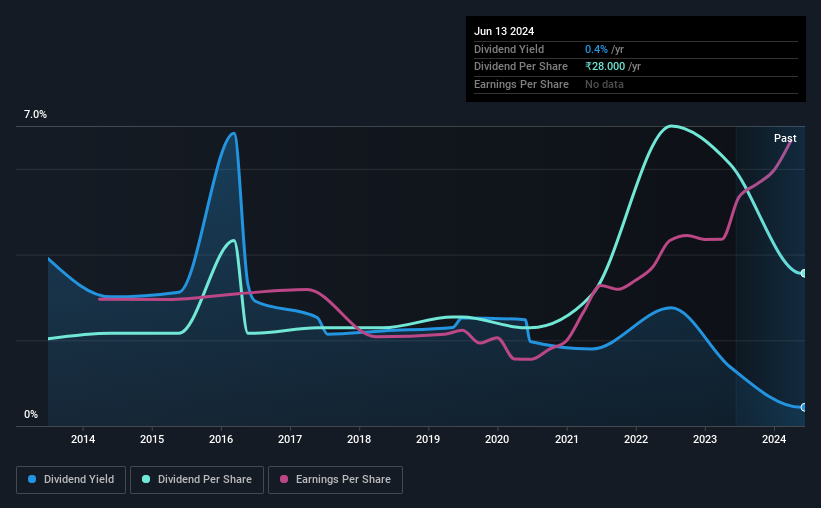- India
- /
- Capital Markets
- /
- NSEI:TATAINVEST
Be Sure To Check Out Tata Investment Corporation Limited (NSE:TATAINVEST) Before It Goes Ex-Dividend

It looks like Tata Investment Corporation Limited (NSE:TATAINVEST) is about to go ex-dividend in the next three days. Typically, the ex-dividend date is one business day before the record date which is the date on which a company determines the shareholders eligible to receive a dividend. The ex-dividend date is an important date to be aware of as any purchase of the stock made on or after this date might mean a late settlement that doesn't show on the record date. Meaning, you will need to purchase Tata Investment's shares before the 18th of June to receive the dividend, which will be paid on the 8th of August.
The company's next dividend payment will be ₹28.00 per share, on the back of last year when the company paid a total of ₹28.00 to shareholders. Last year's total dividend payments show that Tata Investment has a trailing yield of 0.4% on the current share price of ₹6410.50. Dividends are an important source of income to many shareholders, but the health of the business is crucial to maintaining those dividends. We need to see whether the dividend is covered by earnings and if it's growing.
See our latest analysis for Tata Investment
Dividends are usually paid out of company profits, so if a company pays out more than it earned then its dividend is usually at greater risk of being cut. Tata Investment paid out a comfortable 37% of its profit last year.
When a company paid out less in dividends than it earned in profit, this generally suggests its dividend is affordable. The lower the % of its profit that it pays out, the greater the margin of safety for the dividend if the business enters a downturn.
Click here to see how much of its profit Tata Investment paid out over the last 12 months.

Have Earnings And Dividends Been Growing?
Stocks in companies that generate sustainable earnings growth often make the best dividend prospects, as it is easier to lift the dividend when earnings are rising. If business enters a downturn and the dividend is cut, the company could see its value fall precipitously. It's encouraging to see Tata Investment has grown its earnings rapidly, up 25% a year for the past five years.
The main way most investors will assess a company's dividend prospects is by checking the historical rate of dividend growth. In the past 10 years, Tata Investment has increased its dividend at approximately 5.8% a year on average. Earnings per share have been growing much quicker than dividends, potentially because Tata Investment is keeping back more of its profits to grow the business.
To Sum It Up
Should investors buy Tata Investment for the upcoming dividend? Companies like Tata Investment that are growing rapidly and paying out a low fraction of earnings, are usually reinvesting heavily in their business. This is one of the most attractive investment combinations under this analysis, as it can create substantial value for investors over the long run. We think this is a pretty attractive combination, and would be interested in investigating Tata Investment more closely.
On that note, you'll want to research what risks Tata Investment is facing. Every company has risks, and we've spotted 1 warning sign for Tata Investment you should know about.
A common investing mistake is buying the first interesting stock you see. Here you can find a full list of high-yield dividend stocks.
Valuation is complex, but we're here to simplify it.
Discover if Tata Investment might be undervalued or overvalued with our detailed analysis, featuring fair value estimates, potential risks, dividends, insider trades, and its financial condition.
Access Free AnalysisHave feedback on this article? Concerned about the content? Get in touch with us directly. Alternatively, email editorial-team (at) simplywallst.com.
This article by Simply Wall St is general in nature. We provide commentary based on historical data and analyst forecasts only using an unbiased methodology and our articles are not intended to be financial advice. It does not constitute a recommendation to buy or sell any stock, and does not take account of your objectives, or your financial situation. We aim to bring you long-term focused analysis driven by fundamental data. Note that our analysis may not factor in the latest price-sensitive company announcements or qualitative material. Simply Wall St has no position in any stocks mentioned.
About NSEI:TATAINVEST
Flawless balance sheet average dividend payer.
Market Insights
Community Narratives



